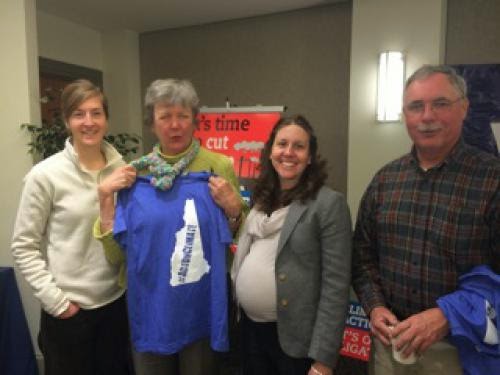"Over 80 Flock for Stacks, Speakers and Climate Action"
Speakers together - Wilhelm, Carlson, Lane, and Presby
DURHAM, NH - Pancakes and maple syrup brightens even the darkest corners of cabin fever as days get longer and spring slowly emerges from snow driven days to the official mud season. At the University of New Hampshire's Halloway Commons, the Climate Impacts Pancake Breakfast highlighted the impacts of climate disruption taking place in New Hampshire on the tasty amber colored syrup. Over 80 people came to enjoy maple syrup, hear the speakers and take action to protect our environment. The forum was hosted by the UNH Sustainability Institute and Student Environmental Action Coalition with sponsors Moms Clean Air Force, Union of Concerned Scientists, National Wildlife Federation, League of Conservation Voters, Environment New Hampshire and New Hampshire Sierra Club.
Speaker Dr. Martha Carlson spoke on the specific climate impacts on maple trees and syrup production in New Hampshire and the region. As a maple farmer in Sandwich, NH, Doctor Carlson has researched the ways changing climate trends have affected the level of sweetness in the maple syrup and the timing for tapping over the years.
The tone of the event was squarely focused on solutions and innovation to help preserve the traditional coming of spring in New England - maple syrup. One such solution is the Environmental Protection Agency's Clean Power Plan that will help reduce climate changing pollution from power plants, the largest source of carbon and greenhouse gases. The Clean Power Plan allows states to adjust the most effective technologies and methods to best reduce pollution to the emissions standards for their state. Flexibility and planning are the hallmarks of the Clean Power Plan - and New Hampshire is expected to be at the front of creating a plan because the state participates in a carbon reduction program already, called the Regional Greenhouse Gas Initiative.
"The Clean Power Plan is our best defense to help save maple syrup in New Hampshire," stated New Hampshire Sierra Club Chapter Director Catherine M. Corkery. "Lowering carbon from power plants and shifting our energy to more renewable sources is the way we can protect our maple trees and local food economy."
Quotations from Speakers:
MARTHA CARLSON, SCIENTIST AND MAPLE FARMER IN SANDWICH
For eight to ten millennia human beings have known precisely when to tap the sugar maples. We knew by the watery blue sky, the warmth of the bark on the tree, the angle of the sun. We developed methods and technologies fitted to a four to six week season. We could count on mild nights just below freezing and warm days just above freezing. The sap always ran just before the Spring Equinox.
Today, something is out of balance. The sap runs earlier than ever before or later than usual, for fewer days or more days. Sap is less sweet than it was a century ago. The filters in the saphouse turn black with sugar sand and the syrup is dark. In summer, the leaves of the sugar maple have more insect damage and in autumn, the leaves turn a dull brown and drop off earlier than usual.
This year with record cold persisting well into spring, with nights so cold even sugary sap can freeze, many of us have not made a drop of syrup yet. And, now, as our orchards thaw out, we may find popped spiles and leaking equipment. Our technologies and methods are not designed for climate disruption. Sugar producers are intelligent and adaptable. So are the maple trees. But there are very few of us. If the sugar maple can be seen as an icon of our culture and environment in New England, then perhaps everyone can help us confront climate change.
What can we do? We have to stop using fossil fuels. We have to invest in alternative energy. We need innovation in science and technology. We need artificial photosynthesis and a new battery that is as easy to use, as portable and as clever as a sugar molecule.
ERIN LANE OF THE USDA NORTHEAST CLIMATE HUB
"In a synthesis of assessed vulnerabilities in northeastern agriculture and forestry, we found that tree fruit and maple syrup are among the region's MOST vulnerable products," said Erin Lane, Director for Partnerships with the USDA Northeast Climate Hub. "The threats include extreme precipitation, drought, pests and early spring followed by frost. On the flip side, a longer growing season could provide opportunities in the northeast. Adaptation can mean BOTH adjusting to and taking advantage of variable weather conditions."
JENNIFER WILHELM, NEW HAMPSHIRE FOOD ALLIANCE
"A Network and Strategy approach allows us to leverage opportunities while addressing challenges and managing risk. It gives us the adaptive capacity to be more resilient to the effects climate change will have on the food system."
CHRIS KEELEY, NH SEA GRANT, UNH COOPERATIVE EXTENSION
New Hampshire Seacoast communities are taking action to prepare for climate change. They are hosting community conversations, reviewing vulnerabilities assessments, and identifying appropriate actions based on the impacts and vulnerabilities made visible by storms in recent years, and based on local research from the University of New Hampshire as well as regional and national research. We are fortunate in New Hampshire to have a collaboration called the New Hampshire Coastal Adaptation Workgroup that combines skills and knowledge of about 20 different organizations to assist communities by providing education, facilitation, and technical assistance.












0 comments:
Post a Comment